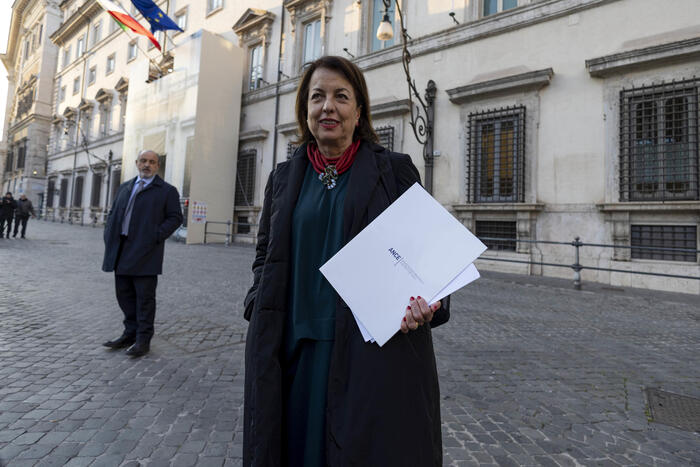Icon: enlarge
Photo: Michael Kappeler / dpa
Laws form the invisible framework for our social coexistence.
In a liberal democracy they secure the freedom of the individual - and they tame the state.
Laws are the foundation of our democracy, without them the rule of law is toothless.
But laws also contain the constant danger that they will be interpreted contrary to their actual purpose, in order to instrumentalize them for one's own agenda and one's own political goals.
And that they are de facto overridden by means of executive ordinances.
This is especially true in times of widespread crises, the often quoted "hour of the executive", when the citizens shout loudly for the hand of the strong state.
Too often the rulers deliberately misunderstand this call as a blank check for barely legitimized authorizations - be it in the event of a terrorist attack, a natural disaster or a global pandemic.
Time and again, individual freedoms are severely restricted in disaster cases, while basic rights degenerate into plasticine in the hands of the executive.
"Again and again, in disaster cases, individual freedoms are massively restricted, while basic rights degenerate into plasticine in the hands of the executive"
In the corona crisis, this development has assumed an extent that is still unknown in the Federal Republic of Germany.
Since the outbreak of the pandemic, federal and state governments have been rapidly issuing ordinances that restrict public life, basic rights and individual freedoms - without a parliament ever voting on them.
And despite ever sharper criticism from the political opposition, from academics, the courts and from the general public, hardly anything seems to be changing.
The latest example of this is a draft from the Federal Ministry of Health, according to which the special rights for Health Minister Jens Spahn, which have been laid down in the Infection Protection Act since the beginning of the pandemic, are being extended and even expanded in an urgent procedure.
According to the draft, Spahn could personally issue ordinances if this "is necessary to protect the population from exposure to serious communicable diseases."
"Just as the pandemic will be limited in time, the special rights of the government must remain exactly that: an exception"
Even this wording in the draft is misleading: Instead of paying attention to the actually applicable mechanism for the "epidemic situation of national scope" from the Infection Protection Act, which has actually granted the minister special rights since the beginning of the pandemic - legitimized by the Bundestag and limited in time - is now only of "serious transferable Diseases ".
How such a disease is defined, i.e. whether a severe flu epidemic will be reason enough to justify extensive special powers in the future, is unclear.
The corona pandemic is, and this must be emphasized again and again, an absolutely exceptional situation.
Just as the pandemic will be limited in time, the government's special rights must remain just that: an exception.
A perpetuation of the executive special rights, as they are striven for in Spahn's new draft law, must not exist - to protect the separation of powers, the rule of law and democracy.
"The planned amendment to the Infection Protection Act is a prime example of how governments seldom voluntarily give up the special rights they have been granted - and instead try to cement their power"
The planned amendment to the Infection Protection Act is a prime example of how governments seldom voluntarily surrender the privileges they have been granted - and instead try to cement their power.
Steps like these show a lack of respect for our constitution and the rule of law.
This also applies to the large number of executive ordinances that no longer need to be legitimized in the spirit of alarmist corona policy.
Rather, according to the mentality of many responsible persons, all those who do not demand or even criticize these measures should justify themselves.
The basic principles of parliamentary democracy are thus taken ad absurdum.
There is consensus in politics, business and society that measures to contain the coronavirus are necessary.
The general population has largely supported the numerous and extensive restrictions associated with this.
Patchwork from the ban on accommodation to curfew
In the event of unjustified interference with fundamental rights, courts have revoked them.
However, with a view to the number of infections, which are now rising again, and the patchwork of executive ordinances that have been hastily woven - from the ban on accommodation to curfew - there is a noticeable increase in displeasure.
It is only a matter of time before the protests against the corona measures flare up again and the disaffection with politics reaches new spheres.
"If the population only finds out from pierced decision papers which measures they have to prepare for in the coming weeks and months, that does not show transparent government policy"
Against this background, the federal and state governments would do well to finally bring their decisions to the parliaments instead of taking barely comprehensible decisions at special summits behind closed doors.
If the population only learns from pierced decision papers which measures they will have to prepare for in the coming weeks and months, that does not show transparent government policy.
As an involuntary fire brigade, it is left to the courts to review the numerous decisions of the executive and, if necessary, to overturn them.
For months it has been criticized in the judgments that the parliaments do not legally secure the corona measures and that the measures are not properly justified.
Chaos, as occurred in the case of the ban on lodging, was inevitable.
And avoidable!
Laws are not a pawn in the hands of the government - even and certainly not in times of crisis as we are currently experiencing.
The constitutional separation of powers with basic rights as the constitutional foundation restrict the government in its actions.
Any decision going beyond this must be legitimized by the legislature, remain an exception, be proportionate and expire as quickly as possible.
Otherwise, the acceptance of the civil protection measures will decline - and the coronavirus will have free rein.
Icon: The mirror







/cloudfront-eu-central-1.images.arcpublishing.com/prisa/GX6T7JPQYZMTYR575K7UVIU6V4.jpg)
